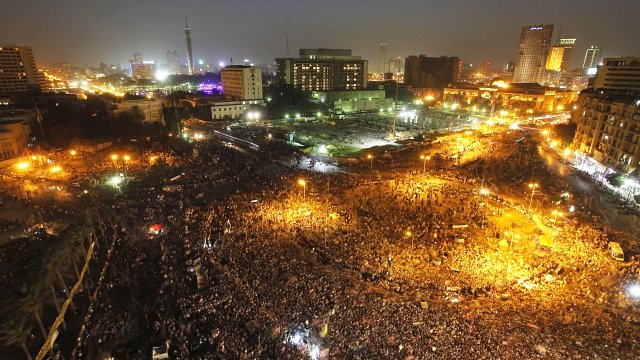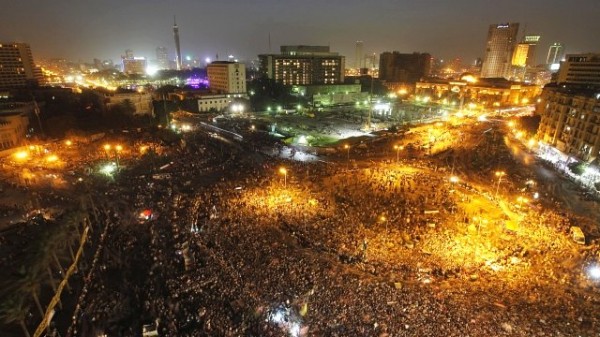
By: Shaykh Musa Furber
Source: http://tahrirsquared.com/node/4528
The uprisings in the Arab world seem to imply a rejection of the thesis that modernity will lead to secularization and the doing away with religion. Rather, it appears, the role and importance of religion in the public sphere is on the rise. It has prompted some to ask whether we are witnessing the result of Islam adopting ‘liberation theology’ – filtered and casted, of course, in an Islamic mould. If there is an Islamic-based liberation, however, then it is necessary to address several questions. What is liberation, who does it liberate and from what, and how is it accomplished?
It is imperative to distinguish between Islam as a comprehensive worldview (including doctrine and practice), and Islam as essentially ‘identity’, as the two are not equivalent. The former relates, although is not identical to, the essential meaning of religio, the Latin word that relates to the ‘binding’ of the created to their Creator: a deeply spiritual covenant. Islam as an identity, on the other hand, is a modern aberration of dubious validity that may give mention to matters central to Islam, but its primary topic is power in this world. Herein lies a significant issue with many contemporary political movements that utilise the language of Islam: their focus and orientation towards those who pray towards the Lord, rather than focusing on the Lord Himself in their activity, inwardly and outwardly.
Liberation theology is originally a non-Muslim religious movement that sought to ‘liberate’ people from certain social conditions, with the underlying assumption being that regular or normative religious doctrine did not automatically result in such liberation. While laudable motives may underpin such a movement, Islam, if it is taken as a comprehensive worldview, is itself a ‘liberation theology’ of sorts. The emphasis of normative Islamic thought is to orientate the believers towards God, which must necessarily ‘liberate’ the believer from impediments to spiritual growth. Without such ‘liberation’, a believer might move very fast indeed – but in what direction?
When one considers engaging in the financial order, for example, has one considered the ethical parameters of the exploitative power of the modern economic system? When one explores participation within modern state structures, has one realised the destruction that has been wrought on the world’s environment, and the consequences it has for current and future generations? Can one truly speak of ‘freedom’, when men of power consider that they are able to bend people to their will owing to the notion that ‘might is right’, as we saw so clearly within the Arab world prior to these uprisings? What real ‘freedom’ exists, when a cruel version of capitalism is used in society, which exploits the world’s resources, the poor, or the environment? Have any of us been ‘liberated’ if women are considered with anything less than the utmost respect they deserve, subjected to harassment, sexual violence and other forms of abuse and attacks against their persons and dignity? Indeed, surely Islam itself is held captive, when sectarianism uses its religious language to try to rip society apart, in complete contradiction to the edicts of Islam?
‘Liberation’ in the normative Islamic worldview, roots itself in the recognition of the Divine, and must transform any believer into a force for mercy, justice, and other illuminated characteristics and attributes. Otherwise, they have failed to realise the message of the most ‘liberated’ human being in history. The Prophet, upon whom be blessings and peace, was, and is, the one whom God spoke of as ‘a mercy to all the worlds’ – and thus, so must all of his followers strive to be the same – to all human beings, who are their brethren either in faith or in humanity, and to all of creation.
What is to be said, then, when mercy is not the dominant trait in a society, and, on top of it, injustice is commonplace? Normative Islamic thought has always favoured stability as a state of affairs, as mercy and justice are even more challenging to achieve in chaos. While there are exceptions, the most common response is to call for change from within, rather than violently invite an unpredictable and chaotic situation, in accordance with the verse that “God changeth not the condition of a folk until they (first) change that which is in their hearts” (Q13:11). It is also in accordance with the established institution of advising leaders to enjoin the good and forbid the wrong, and considering that ‘sincere counsel’ to all – including both governors and the governed – is an intrinsic part of religion.
Within Egypt and Tunisia, the revolutionary protests did not begin as a violent overthrow of the ruler, but rather as an attempt to advise leaders of the intolerable state of affairs and of their shortcomings, and to enjoin the good and forbid the wrong. There is much precedent within Islam for advising and admonishing leaders for their shortcomings. The 13thcentury Damascene scholar Imam al-Nawawi, for example, is famous for addressing and admonishing those in power concerning their shortcomings towards those they governed. What was clear about his approach is that he always remained aware of the ethical and spiritual edicts of Islam in doing so, minimising wherever possible his own personal inclinations. Imam al-Nawawi’s approach meant that such an awareness was present before, during and after deciding upon a course of action – and his decisions flowed from such reliance upon his awareness of God, rather than as an afterthought. It behoves Muslims, of the Arab world and beyond it, to follow his example, though tailored to the context of the modern state that offers a wide range of means for individuals and groups to present their advice, criticism, and wishes to their leadership. Some contemporary Muslim scholars explore this topic at present – but much of their work is unknown, and there is much more work that ought yet to be done.
Libya and Syria were different than Tunisia and Egypt – for within those states, while the protestors began as peaceful calls for the good to be enjoined, they eventually changed to become violent as a reaction to the overwhelming force and brutality of the regimes. The level of chaos and injustice that was perpetrated by the government of Libya in those situations meant that the majority of Islamic scholars of Libya considered, rather early on, that this was one of those exceptional circumstances where in order to restore security, and end chaos, the population was communally obliged to forcefully resist the tyrant.
Syria was somewhat more complicated in that it happened after the others mentioned above. Syrian scholars feared that the bloodshed that was taking place in Libya would be multiplied many times over in Syria; hence why many prominent scholars did not initially support protesting. They were right to be concerned: the government responded to nonviolent protests with intense violence. As protests continued, the increasingly brutal response of the regime meant that eventually, scholars began to change their opinion. Soon the majority of scholars considered that the strife that would emanate due to the continued presence of the regime, would outweigh the chaos that might emerge due to the victory of the revolution. As such, they threw their weight behind the revolution, and advocated it openly, while insisting upon certain ethical conditions to which revolutionaries ought to adhere.
In the final analysis, however, much of this contemporary discussion is rather moot. With the existing political structures in place, such uprisings were inevitable, as the modern age, with colonialist and post-colonialist legacies, has created regimes with tools and abilities that are so oppressive that no society could survive indefinitely in such conditions.
All of this is in sharp contrast to Islam’s pre-modern history where Islam influenced governing authorities and was not merely influenced by them; and where it drove positive change and was not merely hijacked for it. Indeed, early Muslim societies of the Arab world and elsewhere are themselves testimonies to the transformative effect of religion upon individuals. Without such transformed individuals, could societies have been changed? One cannot fail to recall that many of the great Muslim scholars were well known for being socially active, and challenging political authority in different ways, such as Imam al-Nawawi mentioned before. These challenges were not limited to those scholars best known for their mastery of exoteric disciplines, but many others since and before. Examples include the likes of Sidi Omar al-Mukhtar of Libya, who was the leader of Libyan resistance against Italian fascist occupation, and the well-known Sufi master of Syria, Shaykh Abdur-Rahman al-Shaghouri, who agitated for the labour rights of Syrian workers.
In addition to their mastery of Islamic law, these scholars were also committed to the idea that spiritual transformation was paramount before setting out to change society. Their idea of ‘liberation’ included liberation from their own lower desires, as well as a liberation of the mind and body of distractions from worshiping God. While it might be encouraged, this liberation of hearts, minds, and limbs is something that can never be imposed by one person upon another. Ironically, that encouragement is largely absent from current political movements in the Muslim world.
Therein, it would seem, lies the true need for reviving Islam’s own ‘liberation theology’: an integral, organic component that seeks to liberate all men and all women from not only the after effects of war, conflict, trauma, brutality, and other injustices – but by preventing them from even occurring. In that regard, Muslim scholars educate for a liberation that leads to individuals returning to that Qur’anic verse that describes an essential aspect of the Prophetic message which should colour all Muslim activities and in its various forms:
And we did not send you except as a mercy to all the worlds. (Q21: 107)




